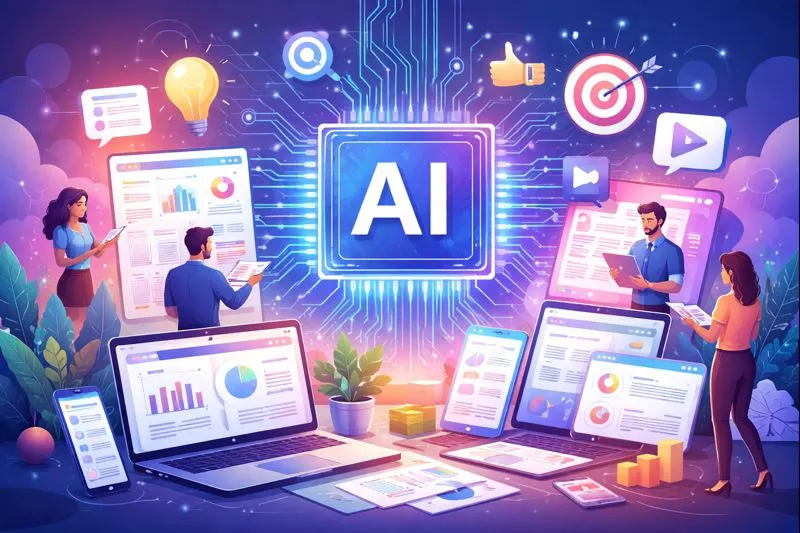The Role of Artificial Intelligence in Modern Education
TL;DR
The AI Revolution in Education: An Overview
Alright, let's dive into how ai is shaking things up in education. It's not just about robots teaching math, I promise. Think of it more like a super-smart assistant for both teachers and students, you know? In this context, ai refers to algorithms and systems designed to perform tasks that typically require human intelligence, like learning, problem-solving, and decision-making, all applied to educational settings.
Personalized learning is becoming a real thing. Ai can help tailor educational content to each student's needs individually... imagine, no more one-size-fits-all lesson plans! A 2024 report by the World Economic Forum states that ai-driven tools can pinpoint students' strengths and weaknesses.
Intelligent tutoring systems are like having a 24/7 tutor. These systems use ai to give students feedback and explanations, kinda like a human tutor would.
Administrative tasks? ai's got that covered too. Grading, scheduling—all that stuff teachers don't really wanna do anyway can be automated. Gradescope, for example, uses ai to make grading way more efficient.
Well, it kinda boils down to ai analyzing tons of data to figure out what works best for each student. It's not perfect, and there's definitely ethical stuff to think about, like data privacy, but the potential is huge, honestly.
Transforming Learning Experiences with AI
Okay, so you're probably wondering how ai is actually changing the way people learn, right? It's not just replacing teachers with robots, thank goodness. It's more about making learning, like, way more tailored and accessible.
Imagine a world where every student gets a learning experience designed just for them. Ai is making this happen by adapting content to individual needs. Kids can actually go at their own pace, which is huge.
As the Swiss Technology Institute points out, platforms are now able to adjust the difficulty of tasks in real-time, making sure students aren't bored or totally lost.
These systems are really good at closing learning gaps, which is crucial for students who fell behind, especially after the learning disruptions caused by the pandemic.
Plus, they give teachers insights into how students are learning, so they can adjust their teaching. It's like having a super-detailed report card on each student's progress.
Teachers, bless their hearts, are swamped—ai assistants can help differentiate assignments, easing the load for them so they can focus more on individual student needs.
It's not just about fancy tech; it's about making education more... human, in a weird way. Let's explore how ai is also boosting efficiency.
AI-Powered Efficiency: Automating Tasks and Enhancing Administration
Okay, so imagine teachers suddenly having a bunch more free time... sounds kinda crazy, right? But ai is actually making it happen!
Automated grading is a game-changer. Ai can now handle multiple-choice and even some essay questions, providing quick feedback. OnlineDegrees.sandiego.edu reports tools provide consistent grading and save teachers time, they say its revolutionizing the whole process.
Lesson planning and content creation becomes way easier. AI can generate high-quality images, customize content, and even create stunning visuals using Image to Video AI, while also finding research materials fast!
School principals aren't left out either. Ai chatbots, powered by natural language processing, can help with drafting emails, scheduling meetings, and even planning professional development sessions. Plus, ai models, using predictive analytics, can analyze tons of data to help with decisions, like figuring out the best time to schedule summer classes.
Basically, ai is handling the boring stuff, freeing up educators to focus on what really matters: teaching and connecting with students. That sounds like a win-win, if you ask me.
Now, let's look at some of the challenges ai brings to the table.
Addressing the Challenges and Ethical Considerations
Okay, so ai in education isn't all sunshine and rainbows, right? There's some real stuff we need to think about, it's not as simple as just plug and play.
Privacy is a biggie. Ai tools, they collect tons of data, which raises questions about how its used and secured. It's essential that schools are upfront about what data they're grabbing and get consent, as onlineprograms.education.uiowa.edu notes, transparency is key here.
Then there's Bias. Ai systems can inherit biases from the data they're trained on. For example, if an ai grading system is trained on data where certain writing styles are unfairly penalized, it might continue to do so, disadvantaging students who use those styles.
Equity is another concern. Not every student has the same access to tech, which can widen the digital gap. Schools need to ensure fair access to ai and training, which includes providing devices, reliable internet access, and user-friendly platforms. The training needed goes beyond basic digital literacy; it involves helping educators integrate ai effectively into their pedagogy.
We need to make sure everyone has a fair shot at benefiting from these advancements.
The Future of AI in Education: A Call to Action
So, where do we go from here, right? It's like, ai's here to stay in education, so what's the plan?
This is about taking the next concrete steps to harness ai's potential responsibly. We need to focus on implementing effective teacher training that goes beyond basic tool usage to pedagogical integration. Ensuring equitable access means actively working to bridge the digital divide, not just hoping for the best. And when we address ethical concerns, we must think about practical measures. For instance, maintaining academic integrity in the face of ai-generated content requires a multi-pronged approach, including developing ai detection tools and redesigning assignments to emphasize critical thinking and original analysis, rather than just information recall.
It's about embracing the potential while, you know, keeping an eye on the ball. Let's do this right.



